|
|
|
Sort Order |
|
|
|
Items / Page
|
|
|
|
|
|
|
| Srl | Item |
| 1 |
ID:
133464
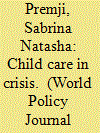

|
|
|
|
|
| Publication |
2014.
|
| Summary/Abstract |
In the winding alleyways of Mlolongo, one of Kenya's densest slums, heavy rainfalls from the previous night carpet the road with mud and animal waste, making both nearly impossible to avoid. Visitors approach and remove their shoes at the door to Mama Agnes' home, a mud shack, then step into a room where the air is pungent with the smell of urine and feces. In the darkness, one misstep and a visitor stumbles upon an infant, who seems unshaken by the accidental nudge. A few steps further lie two dozen more infants, none older than 18 months-some sitting on a broken couch, many lying on the concrete ground. Though all awake, their perfect little bodies remain still, only their bellies rising with each breath. In an eight-foot square space, there are at least 25 babies, and the only sound-silence.
|
|
|
|
|
|
|
|
|
|
|
|
|
|
|
|
| 2 |
ID:
192848
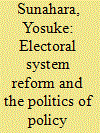

|
|
|
|
|
| Summary/Abstract |
As women’s participation in the workforce expands, many countries seek to reform child care support by changing the gender division of labor. Japan also attempted universalistic child care support reforms, though these were not always successful. The electoral reforms of the 1990s prompted the major political parties to make universalistic reforms, and the major party leaders advocated similar ideas. Still, they failed to extend benefits to all children. Agreement on the expansion of funding was particularly challenging. By analyzing coalition formation within and among political parties, I show that the electoral reform led to stiff competition, which made it difficult for parties to agree. The change to a majoritarian electoral system not only intensified inter-party rivalry but also made it difficult to persuade intra-party groups that perceived a threat to their electoral success.
|
|
|
|
|
|
|
|
|
|
|
|
|
|
|
|
| 3 |
ID:
109751
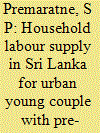

|
|
|
|
|
| Publication |
2011.
|
| Summary/Abstract |
This research note focuses on the labour supply decision in Sri Lanka of parents with the presence of pre-school children. For this study, 200 households with at least one pre-school child were surveyed. Women's non-market time does not depend on their husband's wage; but both housework and child care of other adults-particularly female adults-respond positively to an increase in the wife's labour force participation. The decision to buy formal child care is affected by the age of children, cost of day-care centres, household income, types of occupation and level of education and quality of child care. Quality child-care services increase female labour force participation. Moreover, if child care is more affordable, more mothers would participate in the labour force. Governments can embrace this argument.
|
|
|
|
|
|
|
|
|
|
|
|
|
|
|
|
| 4 |
ID:
155556
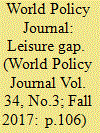

|
|
|
|
|
| Summary/Abstract |
World Policy Journal examines six countries to see how the burden of child care, household chores, and other unpaid work falls disproportionately on women.
|
|
|
|
|
|
|
|
|
|
|
|
|
|
|
|
| 5 |
ID:
155541
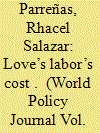

|
|
|
|
|
| Summary/Abstract |
In homes across Asia, the Middle East, and the United States, female migrant laborers are doing the difficult work of child and elder care. But these women often leave behind children of their own in countries such as Indonesia and the Philippines. Rhacel Salazar Parreñas, a professor of sociology and gender studies at the University of Southern California, describes how the lack of legal protections for domestic laborers has made it more challenging for women to be present in their children’s lives.
|
|
|
|
|
|
|
|
|
|
|
|
|
|
|
|
| 6 |
ID:
128432


|
|
|
|
|
| Publication |
2014.
|
| Summary/Abstract |
In July 2011, Laurentiu Ierusalim left his Romanian orphanage, the only home he had ever known. He had less than $150 in his pocket and nothing more than the clothes he was wearing. He had no job, no housing, and no clue how to survive. "I didn't know what to do," Ierusalim says, "so I slept in a playground across the street." It was the beginning of two years of homelessness, of knocking on doors to ask for food and shelter. An Orthodox priest helped him find families to take him in for several weeks at a time. Last summer, after finally surmounting the formidable bureaucratic and financial obstacles required to secure a government ID, he landed his first job as a grocery store clerk. With slight variations, Ierusalim's story is told over and over again in the experiences of the tens of thousands of children shunted away in Romanian orphanages during the reign of communist dictator Nicolae Ceausescu. The execution of Ceausescu and his wife on Christmas Day 1989 led to the discovery of the country's most disturbing secret-enough abandoned children to make up a city had been living in squalor for years, packed into unsanitary orphanages without appropriate resources, care, or stimulation.
|
|
|
|
|
|
|
|
|
|
|
|
|
|
|
|
|
|
|
|
|